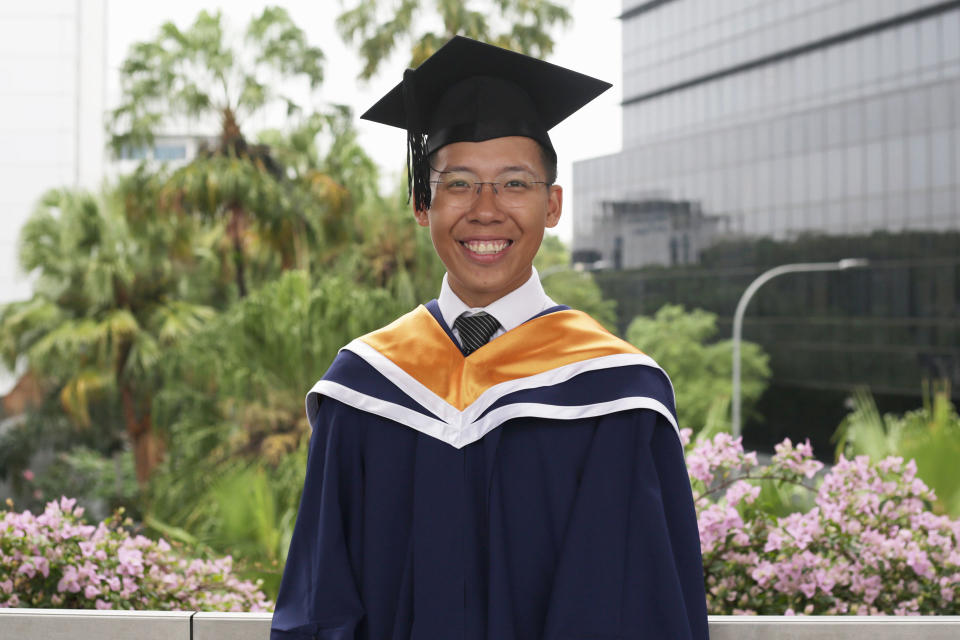NTU grad turned dyslexia into 'strength' to emerge top student and Rhodes scholar
SINGAPORE — While some may view having dyslexia as being a hurdle on one’s academic ambitions, Edward Yee Yew Fai learnt to embrace it as a strength.
“There are dyslexics around the world who have done incredible work: Steve Jobs, Richard Branson, Henry Ford. Lee Kuan Yew was dyslexic,” said the 24-year-old, who graduated from Nanyang Technological University (NTU) on Tuesday (23 July) with a double degree in Business and Accountancy.
“You look at that and it’s very obvious they think differently. And because of that they are able to use it as a strength, as a real skill set,” he added during an interview with Yahoo News Singapore following his graduation ceremony.
Yew, who is one of over 9,000 students to graduate from NTU this year, is also the valedictorian of his cohort and Singapore’s first Rhodes scholar in 14 years.
Describing his dyslexia – a form of cognitive disorder that affects one’s reading ability – Yew said he believed the condition allows him to see things from “very different angles” and that this helped him especially at the higher education level.
“Regular people think in words. We (dyslexics) think in pictures. This creates a very different way of thinking when it comes to approaching problems,” he said.
“For me, I think (dyslexia) allows me to see synergies between different disciplines. Between, for example, things like finance and philosophy and how to bring the two together.”

Learning to thrive
Yew’s academic journey has not always been smooth sailing. He recalled struggling during his primary school years, especially with subjects that required a lot of memory work.
“Chinese was the most difficult... as you literally have to remember every single stroke. In English, you can kind of piece things together. So my spelling might be horrible but I know what the word is,” he explained.
It was only in Primary 5 that Yew was diagnosed with dyslexia, which led to him being exempted from having to take Chinese as an academic subject.
Things became easier in Secondary 3 when he entered National Junior College’s Integrated Programme, where the learning was more “conceptual” in nature and not heavily reliant on memory work. He also picked Physics, Chemistry, Maths and Economics for his A-level subjects, which were easier for him to excel in.
Yew also credits his parents for creating an environment in which he was taught not to look at his condition as a disability.
For example, his father worked with him to create a colour coding system for studying while his mother helped him with scheduling. He also developed his own “style” of learning over the years.
“Today, I create structures that I utilise on a day-to-day basis. In these structures, I put different bits of information. I don’t necessarily remember all the bits of information, but I know these structures very well,” said Yew.
“I think being dyslexic helps me see the structures better and use them very efficiently.”
Giving back through his non-profit group
Even as he learnt to help himself, Yew was also driven to give back to society. In 2014, he was contacted by the Dyslexia Association of Singapore (DAS) and asked if he could share his story with others like him.
Through the DAS, he worked with schools such as the Institutes of Technical Education, the National University of Singapore, the Nanyang Technological University and the Singapore Management University to create more programmes for dyslexia screening among students.
Noting that there wasn’t much support for older dyslexics, Yew helped to share his experiences with them on turning dyslexia into a strength.
In 2018 he started a non-profit group called GivFunds, which provides low-cost loans to social enterprises in South Asia and Singapore.
Inspired by a trip to Bangladesh and his backpacking experiences around South-east Asia, Yew said he wants to help such businesses to grow.
“I stayed with social entrepreneurs. I lived in slums with them. I saw the amazing work they were doing and said, ‘Well I’m not going to make something as good as that so the next best thing I can do is to help them’,” he added.
With his Rhodes scholarship in hand, Yew is set to begin studying for his double master’s degrees in Evidence-Based Social Intervention and Policy Evaluation, and Social Data Science at Oxford University later this year.
He intends to channel the knowledge he acquires back into growing Givfunds.
“In 10 years I see myself really having the skill sets and resources to support change makers all over the world... For me, this means providing these people who are changing human lives, who are pushing the human race forward, with all the resources they need to do what they do best,” he said.
More Singapore stories:
'You must give yourself a second chance': former convict turned NTU graduate
More than 20 tonnes of pangolin scales, ivory worth $66M seized in Singapore



